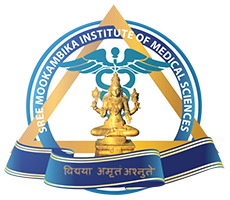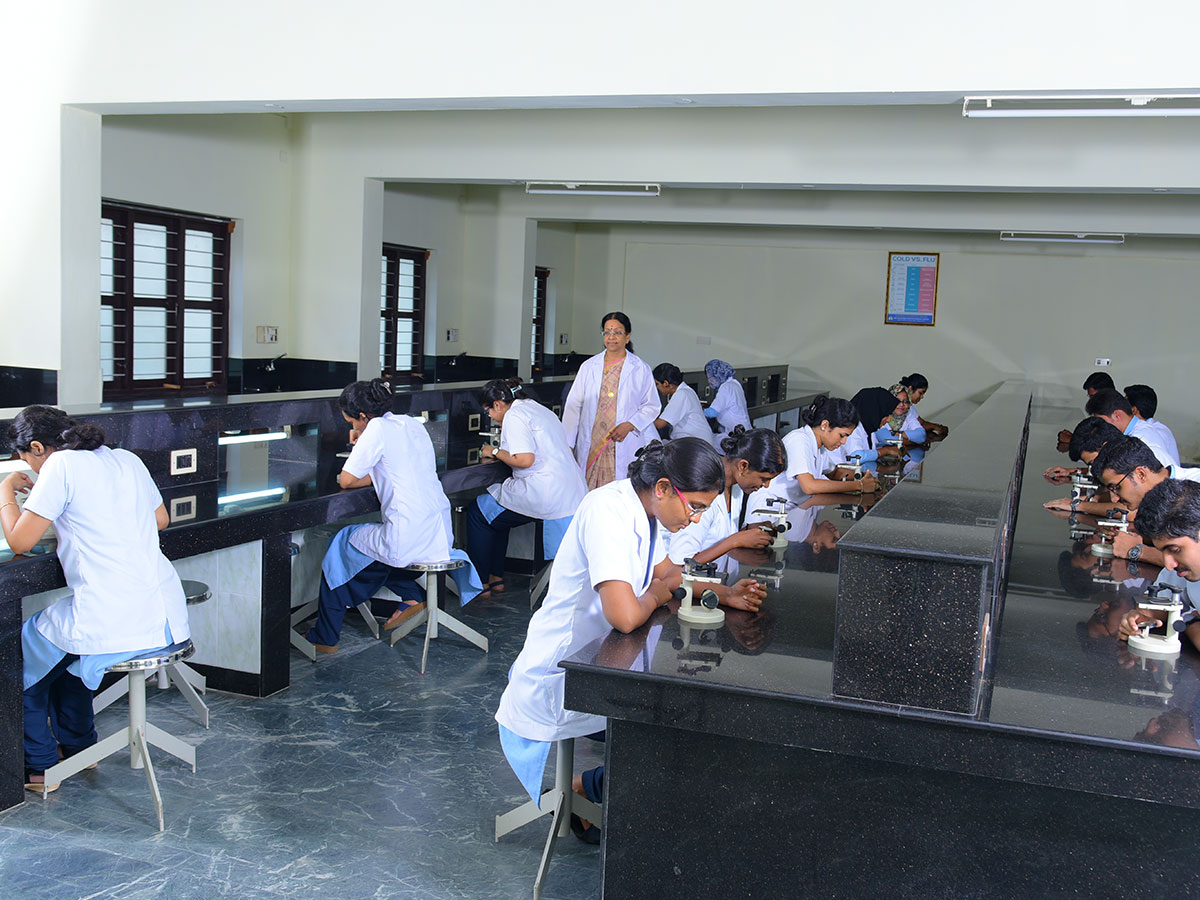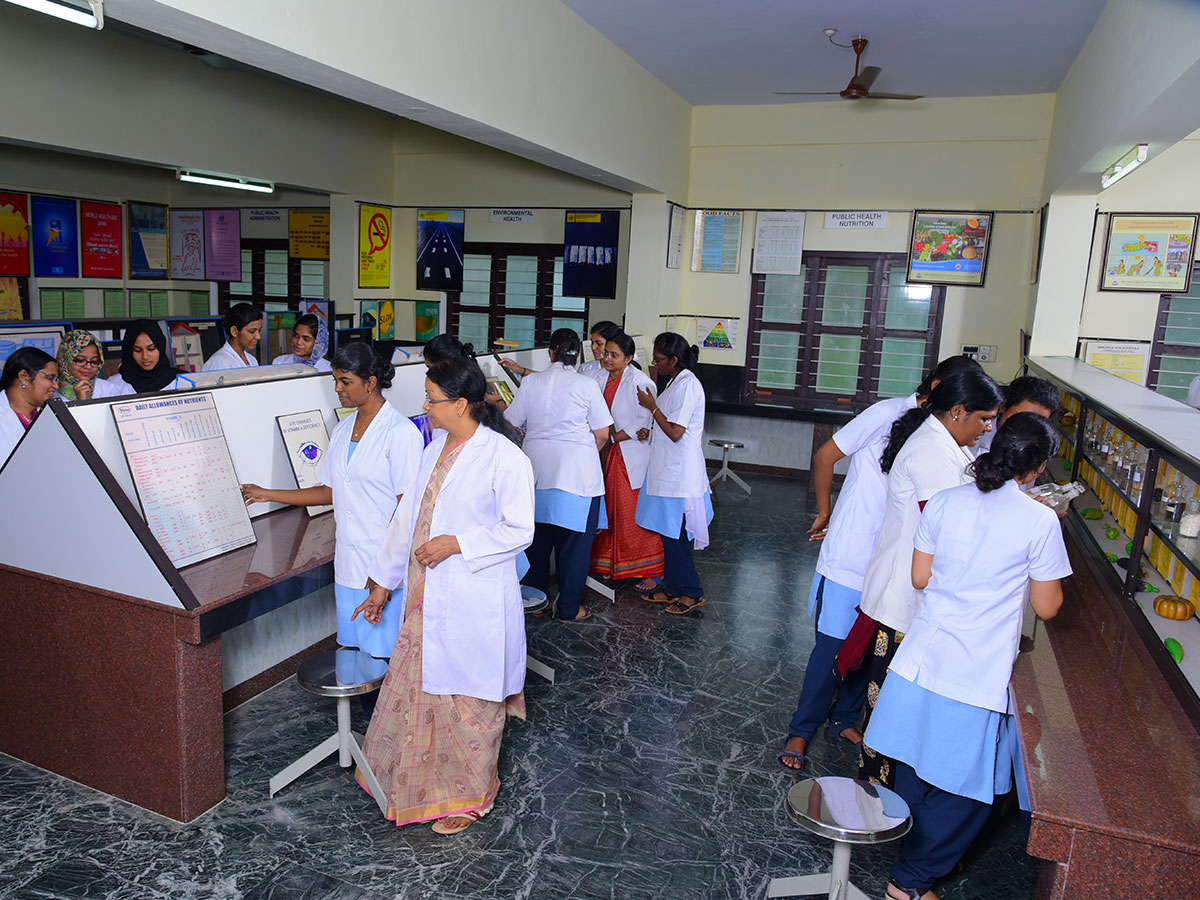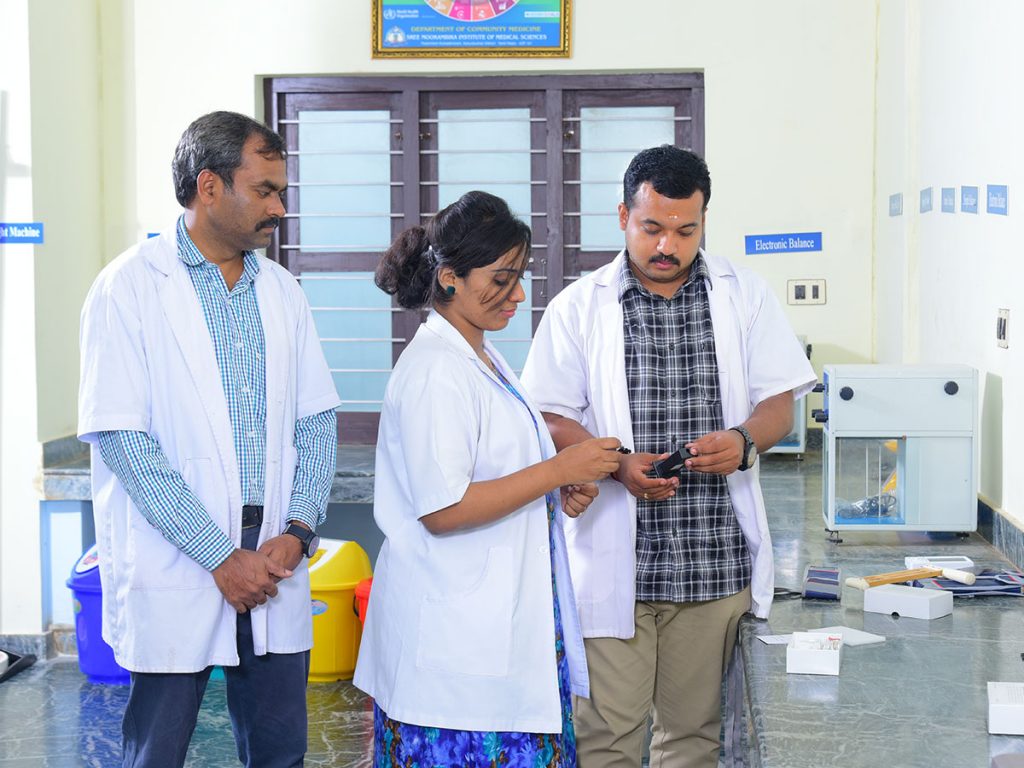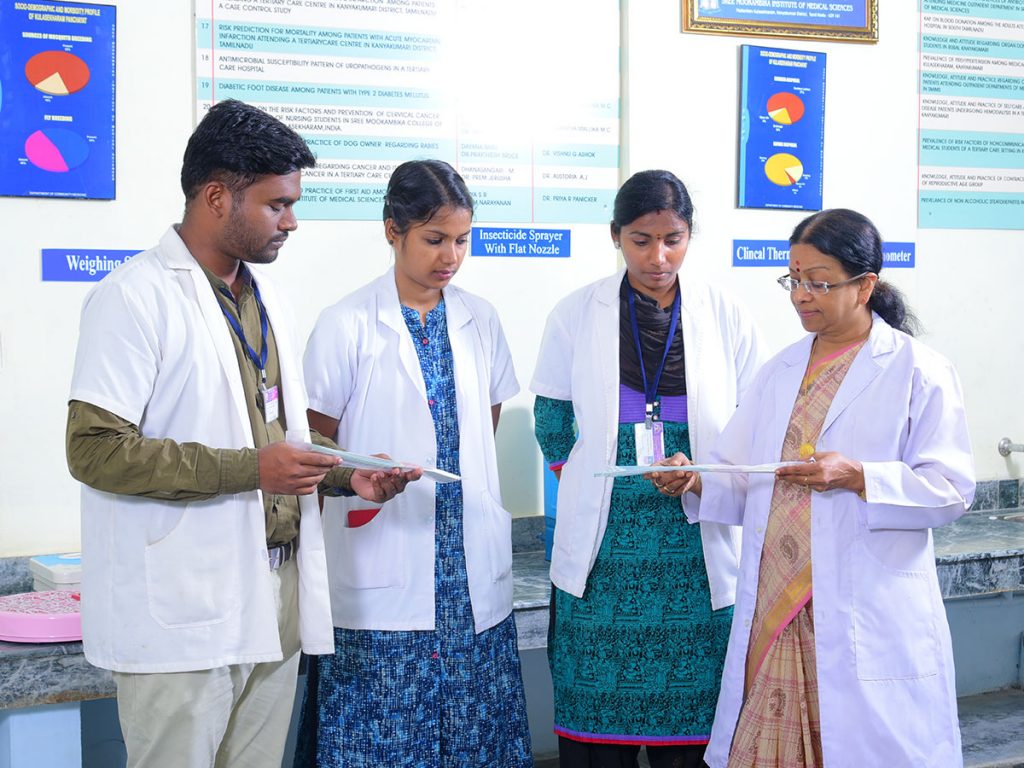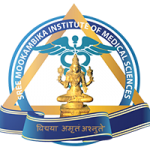Introduction
The Community Medicine course in MBBS is designed to familiarize medical students with some basic health promotion concepts and practices. The broad goal of teaching in Community Medicine is to prepare the student to function effectively as a community physician and an efficient public health leader.
Focus of the Department
Create efficient Indian Medical Graduates who will be able to function effectively in the community both inside and outside India.
Objectives
At the end of the course, the student should be able to:
- Understand the concepts of health and disease, and describe the levels of prevention and modes of intervention
- Describe the epidemiological methods and apply appropriate epidemiological methods to study and manage communicable and non-communicable diseases in the hospital and community situations
- Define vital statistics and describe the various methods that are used to collect data, apply bio-statistical methods and techniques to make inferences and describe the health information systems
- Outline the demographic pattern of the country and appreciate the roles of the individual, family, community and socio-cultural milieu in health and disease
- Diagnose and manage maternal and child health problems and advise couples and the community on the family planning methods available.
- Describe the methods of nutritional assessment to diagnose and manage common nutritional problems at the individual and community levels.
- Enunciate the principles and elements of primary health care; describe the organization and functions of the health care team at Primary Health Centre, Community Health Centre and District levels.
- Describe and evaluate the various National Health Programmes with particular emphasis on maternal and child health programmes, family welfare and population control, communicable and non communicable disease prevention and its implementation in the community.
- Describe the importance of water and sanitation in human health; identify and investigate the environmental and occupational hazards, disaster, and disease outbreak and apply management techniques for their control.
- Describe the principles and practice of health education and to apply appropriate communication skills to bring about behavioural change in the community
- Capacity to plan and implement the measures for disaster.
Facilities Available
- Rural Health Center
- Urban Health Center
- Facilities on campus
- 1 Demonstration Room – 60 Sq M with LCD and Overhead Projector facilities
- Laboratory – 150 Sq M with 60 seats, 32 microscopes, Laboratory Manuals, TV & DVD Player, Computer, Over Head Projector
- Museum – 150 Sq M, 30 seats
- Small specimens in glass cupboards and large specimens on tables
- Models, exhibits, Charts, Photographs & other materials covering P.H. Administration, Epidemiology, Nutrition, Entomology & Parasitology, MCH & FP, Demography & Vital statistics
- 10 specimen catalogues
- Department Library cum Seminar Room – 30 Sq M, 25 seats, with 151 books in Community Medicine and allied subjects
- Research Laboratory – 60 Sq M, with computer and internet
Teaching Program
Meet the general learning objectives of the course to be achieved at the end of 3rd MBBS Part – 1 medical training using different modes of theory and practical teaching. This includes
- Define and explain health in a holistic manner
- Develop an understanding of local health care delivery system
- Identify important determinants of health, risk factors of disease and epidemiological characteristics of indigenous population
- Seek, facilitate and promote community participation in provision of healthcare
- Create awareness and disseminate through available and appropriate means, information to individuals and community regarding development/adaptation of healthy life style behaviours/healthy social environment
- Identify, develop and support local partnership with workforce from allied sectors and with relevant stakeholders to broaden the local response to health inequalities.
- Create awareness and demand for services like immunization, prenatal and postnatal care, family planning, good hygienic practices and health education regarding communicable and non communicable diseases.
- Create awareness and sensitivity to provide health care to underserved populations.
- Know the steps of basic Research Methodology and importance of dissemination of evidence based knowledge.
UG Teaching Programme (1 to 7 Semesters)
| Methodology | Year | ||
|---|---|---|---|
Didactic Lectures | 1 and 2 | 3, 4 and 5 | 6 and 7 |
Demonstrations | 30hrs | 144 hrs | 26 hrs |
Tutorials | 2 seminars during 1 MBBS attended by 100 students. | ||
Seminars conducted during the year. | 4 seminars presented by each student during field postings. | ||
a) Rural Practice Field
| Subject | Time Spent | Year of the student in Medical College | Observation | Demonstration | Participation |
|---|---|---|---|---|---|
Community Medicine | 30 hrs | II MBBS III Semester IV Semester VI Semester | 6 hrs | 3hrs 3hrs | 12 hrs 18 hrs 30 hrs |
b) Urban Practice Field
| Subject | Time Spent | Year of the student in Medical College | Observation | Demonstration | Participation |
|---|---|---|---|---|---|
Community Medicine | 9 hrs | II MBBS | - | - | 9 hrs |
c) Field Visits
| Sl.No | Title | Description |
|---|---|---|
1 | Vital statistics |
|
2 | Environmental Sanitation |
|
3 | Communicable/non-communicable Diseases. |
|
4 | Public Health Laboratory service: |
|
5 | Maternal & Child Health, Family Planning: |
|
6 | School Health Service |
|
7 | Others ( Specify) |
|
d) Internship Training
- Period of posting in the department – 2 months
- Pattern of posting
- Rural Health Centre/Primary Health Centre – 3 weeks
- Urban Health Centre – 1 week
- Other postings
- National Health Programmes
- Posting for 1 week each in T.B Clinic & Immunisation Clinic
- Clinics related to various National Health Programs
- School Health & Family Welfare Services during their posting in Rural Health Centre
- Day to day assessment by the Assistant Professors in- charge of the Rural and Urban Health Centres. Overall assessment and evaluation of Project to be done by the HOD.
PG Teaching Programme
- Topics in the syllabus are divided amongst all teachers and classes taken in the afternoon.
- All the postgraduates are expected to present a Journal, Seminar, Epidemiological exercise session & Management exercise session per month.
- They conduct discussion regularly for the MBBS students, give assignments and evaluate them
- In rotation they present the analysis & technical discussion part of the institutional journal club conducted every month.
- The PGs are regularly assigned MBBS discussion/demonstration classes of undergraduates during their postings in the forenoon.
- They also expected to present the progress of their thesis work once in 3 months.
- They are expected to submit their log book to the HOD every Monday.
- Monthly test at the end of each month for all PGs
- Visits to places of public health importance like Water Treatment plant, Sewage Treatment plant, Slaughter house, milk Dairy, Factories.
- Students are expected to take part in guiding research of Interns as Co-guides
Year Wise Teaching Programme
- Selection of topic and preparation of protocol for thesis work
- MBBS classes – theory & practical (conducting & attending)
- They attend the lecture classes and forenoon discussion for undergraduates whenever they do not have other assigned duty.
- During the 2ndhalf of the year they are posted to the RHC and UHC on a monthly basis
- Attending CME and conference
- Complete review of literature of thesis topic and collect data for thesis
- Carry out analysis of data of thesis
- MBBS classes – conducting practical
- During first half they do posting in other departments(Interdepartmental posting)
- Posted to the RHC and UHC in rotation on a monthly basis
- Clinico-social case study.
- Visit to Institutes of Public Health Importance.
- Presenting Independent research papers in CME and conferences
- Attend Workshops including Research Methodology Workshop
- Complete thesis and submit
- Paper publication (at least e-journal)
- Carryout family health study, Clinico-social case study and discussion in the community
- Pedagogy exercises
- MBBS classes – conducting theory & practical classes
- Presenting Independent research papers in CME and conferences
- Model examination (theory & practical)
